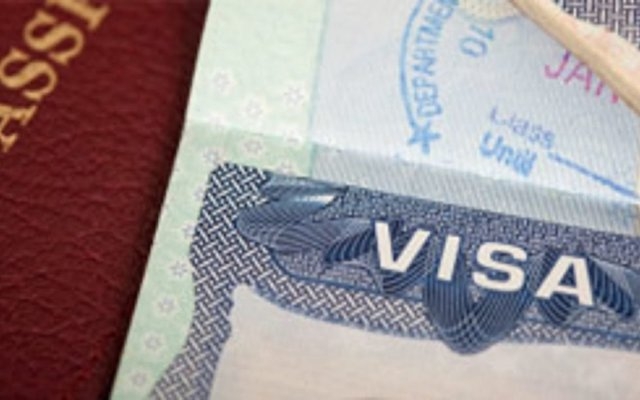In a disturbing development that holds substantial ramifications for the U.S.-Israel bilateral relationship, a group of 15 Democratic senators has sent an unequivocal letter to U.S. Secretary of State Antony Blinken. The well-publicized request strongly advises against moving ahead with plans to include Israel in the U.S. visa waiver program. Addressed also to Alejandro Mayorkas, Secretary of Homeland Security, the letter contends that Israel is unlikely to comply with all the stipulated conditions for inclusion by the set deadline of September 30. It is believed that the Senators sent the letter at the behest of pro-Palestinian groups which have been working to thwart the long-awaited visa-waiver status for Israel.
Initiated by Senator Chris Van Hollen, the letter garners additional weight by the signatures of several prominent senators from the far-left progressive causus including former presidential contenders Bernie Sanders and Elizabeth Warren. These lawmakers, despite having been briefed by the State Department concerning the progress and procedures related to Israel's prospective inclusion in the visa waiver program, remain deeply apprehensive about the unfolding situation due to their ties to Palestinian activists and their 'community organizing' abilities.
This is so absurd that 15 US senators who don’t actually know anything about living in Israel are dictating how Israel and Israeli companies should increase their own security risk for visa waiver with the US— including demanding Palestinians can rent cars at Ben Gurion and go to… pic.twitter.com/gvx75ZM1E0
— Emily Schrader - אמילי שריידר امیلی شریدر (@emilykschrader) September 9, 2023
Central to their concerns is a specific clause in a bilateral agreement signed between the United States and Israel in July. This clause states that Israel will enact a uniform visa regime applicable to all American citizens, but only beginning on May 1, 2024. This planned date is notably far removed from the immediate deadline, giving rise to concerns about incongruity with the principle of reciprocity in visa procedures—a principle that the Biden administration ardently supports.
The principle of reciprocity insists on equitable and parallel treatment for citizens of both the U.S. and Israel when entering each other’s territories. The senators, pointing to this principle, question the planned arrangement for American-Palestinians residing in the West Bank which is under Palestinian control, with excpetion to Area C which is under Israeli administration as per the internationally recognized Oslo Accords. Unlike their Israeli counterparts who would likely benefit from a streamlined, one-step entry process into the United States, these American-Palestinians are expected to navigate a more complicated two-step entry process into Israel. The fact that they will be able to travel through Israel in general is a sign of shifting times considering Palestinians typically use the Jordanian crossings to enter Palestinian territories.
No surprise at the signatories not to admit Israel to the US Visa Waiver Program due to its “discrimination against Palestinian-Americans.” https://t.co/VgK3yKZAPP pic.twitter.com/QUPwH2mJdK
— GatorPrincess 🟦🐊🇮🇱🇺🇸 #JusticeforMalkiRoth (@MichelleF_35) September 9, 2023
The letter also takes painstaking effort to align its arguments with American jurisprudence, stating that no American legal provision allows for discriminatory treatment among diverse groups of U.S. citizens, even if that discrimination is short-lived and followed by uniform treatment later. It explicitly says, "There is no section of American law that stipulates a country entering the visa waiver program can discriminate between various groups of American citizens temporarily, even if plans exist for uniform treatment in the future."
Further complexity arises from the benchmarks that Israel is expected to meet. If the country is unable to fulfill the reciprocity conditions by September 30, the senators advocate for a one-year extension, giving Israel ample time to make the requisite adjustments for full compliance. During prior briefings, the senators were informed that any failure to include Israel in the current cycle could add unnecessary complications in future years, particularly because Israel managed this year to meet the less than 3% visa application refusal rate—a condition that may not hold in subsequent years.
Thank you @SenJackyRosen for your outspoken leadership in support of Israel’s entry into this program!
— AIPAC (@AIPAC) September 8, 2023
Your letter with @SenRickScott signed by 65 senators—a majority from both parties—makes clear the Senate strongly backs Israel’s entry into the Visa Waiver Program this year. https://t.co/CiCryfZB65 pic.twitter.com/elK5Xybwka
The letter doesn’t shy away from addressing the alleged challenges that Americans of Palestinian origin who reside in the West Bank might face. It specifically cites their inability to enter Israel using their personal vehicles or to rent cars upon landing at Ben-Gurion Airport. Typically, the U.S. does not get involved in private corporate decisions on who is eligible to rent cars, however the inclusion of this in the letter is a sign that the criticism is stemming from anti-Israel activists who often apply a double standard to Israel over other countries.
While the senators are actively seeking an immediate conversation with Secretary Blinken, their overarching message is unambiguous: Despite the hard work and concessions Israel has made on security to qualigy for this program, Israel's potential entry into the U.S. visa exemption program should be held off. This development serves to highlight the intricate layers of complexity that continue to characterize the U.S.-Israel relationship, from international obligations to issues of national sovereignty. With the deadline swiftly approaching, both nations must tread carefully, keeping an eye on the long-term implications of their decisions for this strategic partnership.


